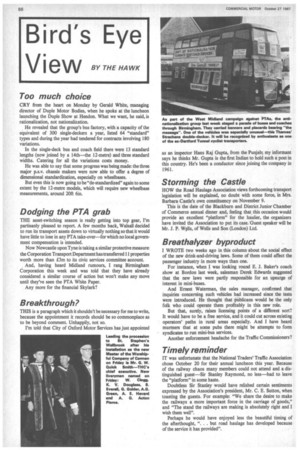Bird's Eye
Page 68

If you've noticed an error in this article please click here to report it so we can fix it.
ViewBY THE HAWK
Too much choice
CRY from the heart on Monday by Gerald White, managing director of Duple Motor Bodies, when he spoke at the luncheon launching the Duple Show at Hendon. What we want, he said, is rationalization, not nationalization.
He revealed that the group's bus factory, with a capacity of the equivalent of 300 single-deckers a year, listed 64 "standard" types and during the year had tendered for contracts involving 180 variations.
In the single-deck bus and coach field there were 13 standard lengths (now joined by a 14th—the 12-metre) and three standard widths. Catering for all the variations costs money.
He was able to say that some progress was being made: the three major p.s.v. chassis makers were now able to offer a degree of dimensional standardization, especially on wheelbases.
But even this is now going to be "de-standardized" again to some extent by the 12-metre models, which will require new wheelbase measurements, around 20ft 6in.
Dodging the PTA grab
THE asset-switching season is really getting into top gear, IM partisanly pleased to report. A few months back, Walsall decided to run its transport assets down to virtually nothing so that it would have little to lose in any PTA take-over—for which no local government compensation is intended.
Now Newcastle upon Tyne is taking a similar protective measure: the Corporation Transport Department has transferred 11 properties worth more than £3m to its civic services committee account.
And, having heard Midland rumours, I rang Birmingham Corporation this week and was told that they have already considered a similar course of action but won't make any move until they've seen the PTA White Paper.
Any more for the financial Skylark?
Breakthrough?
THIS is a paragraph which it shouldn't be necessary for me to write, because the appointment it records should be so commonplace as to be beyond comment. Unhappily, not so.
I'm told that City of Oxford Motor Services has just appointed as an inspector Hans Raj Gupta, from the Punjab; my informant says he thinks Mr. Gupta is the first Indian to hold such a post in this country. He's been a conductor since joining the company in 1961.
Storming the Castle
HOW the Road Haulage Association views forthcoming transport legislation will be explained, no doubt with some force, in Mrs. Barbara Castle's own constituency on November 9.
This is the date of the Blackburn and District Junior Chamber of Commerce annual dinner and, feeling that this occasion would provide an excellent "platform" for the haulier, the organizers have invited the Association to put its case. Guest speaker will be Mr. J. P. Wells, of Wells and Son (London) Ltd.
Breathalyzer byproduct
I WROTE two weeks ago in this column about the social effect of the new drink-and-driving laws. Some of them could affect the passenger industry in more ways than one.
For instance, when I was looking round E. J. Baker's coach show at Bordon last week, salesman Derek Edwards suggested that the new laws were partly responsible for an upsurge of interest in mini-buses.
And Ernest Waterman, the sales manager, confirmed that inquiries concerning such vehicles had increased since the tests were introduced. He thought that publicans would be the only folk who could operate them profitably in this new role.
But that, surely, raises licensing points of a different sort? It would have to be a free service, and it could cut across existing operators' paths in rural areas especially. And I have heard murmers that at some pubs there might be attempts to form syndicates to run mini-bus services. Another enforcement headache for the Traffic Commissioners?
Timely reminder
IT was unfortunate that the National Traders' Traffic Association chose October 20 for their annual luncheon this year. Because of the railway chaos many members could not attend and a distinguished guest—Sir Stanley Raymond, no less—had to leave the "platform" in some haste.
Doubtless Sir Stanley would have relished certain sentiments expressed by the Association's president, Mr. C. E. Sutton, when toasting the guests. For example: "We share the desire to make the railways a more important force in the carriage of goods," and "The stand the railways are making is absolutely right and I wish them well".
Perhaps he would have enjoyed less the beautiful timing of the afterthought, ". . . but road haulage has developed because of the service it has provided".






















































































































